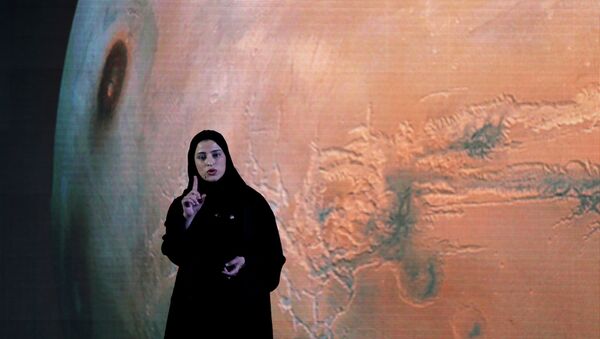Declaring that the development of a robust space program is "a primary national objective," the UAE has announced their intention to send an unmanned probe named Hope to circle the red planet for up to four years.
To accomplish this feat, the tiny Gulf nation will create the first space research center in the Middle East with a price tag over over $27 million over five years. The UAE will also provide the first space science master's degrees for the region's would-be space explorers.
— Dubai Media Office (@DXBMediaOffice) May 25, 2015
Officials unveiled the plan in Dubai earlier this month, an ambitious step to catch up to other would-be space exploring powers like India — which has launched a Mars mission of its own — and China.
The scientists at the Mohammed Bin Rashid Space Agency hope to gather data about Mars' atmosphere and climate, and, in general, will focus on finding parts of the universe that could potentially support life.
A team of 70 Emirati engineers and researchers have spent a decade on what Ibrahim Hamza Al Qasimi, head of strategic research at the center, called "three-phased know-how transfer program," to get them up to speed on the necessary technologies for space exploration, CNN reports.
"This project usually takes 10 years but we need to get it kicked off within six," Al Qasimi told CNN, and there is a reason for the seeming rush to get the Hope probe up and running by 2020, and possibly orbiting Mars by 2021.
"The date 2020 is important for us because we want to show the world what the UAE has achieved in only 50 years of its existence," said Al Qasimi.
— UAE Mars Mission (@UAEMarsMission) May 6, 2015
The name of the probe, Hope — Al Amal in arabic — was chosen in a public polling of tens of thousands of Arabic speakers via social media. And there are pretty high hopes pinned on the success of this project and what it could mean for the country.
"This is an investment in the future of the UAE, in diversifying our economy, in being creators and generators of technology rather than just users, and that's the only way that we can move closer towards our knowledge-based economy and generate the necessary knowledge to sustain that economy," Sarah Amiri, the deputy project manager and science lead from the program, told The National.
— UAE Mars Mission (@UAEMarsMission) May 26, 2015
The UAE currently depends on the production of oil for 40% of its earnings and has been working on diversifying its economy for some time. The low and fluctuating price of oil makes it a difficult base to depend on, and there is also the fear that someday, the oil will be gone.
Speaking in February, Crown Prince Sheikh Mohammed bin Zayed was brutal in his honestly, predicting that his country's oil reserves could be gone in just 50 years, the BBC reports.
The UAE is ramping up its fledgling program at a time when traditional space powers — the US, Russia and Europe — have seen flagging investment in space exploration.
Instead, private-public partnerships, and entrepreneurs like Richard Branson or Elon Musk and encroaching on the technological and research territory formerly thought to be that of states alone. In fact, the UAE has invested an undisclosed amount of the $5 billion they've already spent on their space program, in Branson's program, Virgin Galactic.
But that $5 billion — over the last decade — is still small compared to spending by Russia, who has budgeted $37 billion for its space program over the coming decade, or even India, who spends a billion dollars a year on its emerging program.



